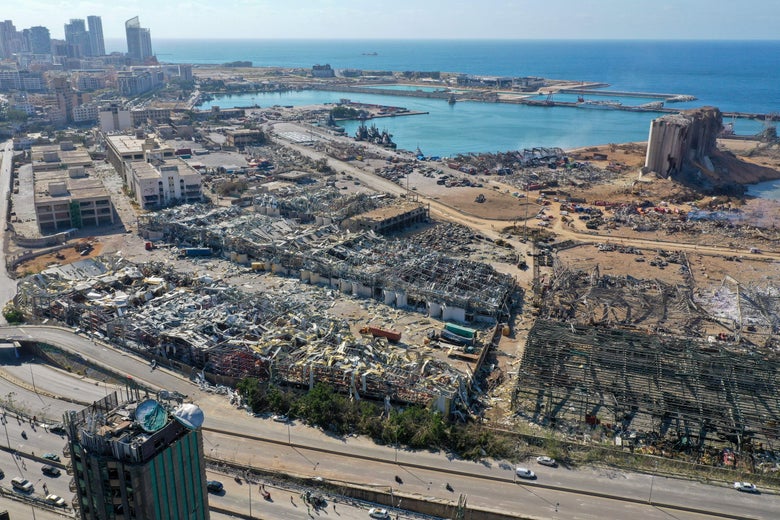
In 2013, the Rhosus, a Moldovan-flagged cargo ship, was transporting ammonium nitrate from Georgia to Mozambique when it experienced mechanical problems and entered the port of Beirut, according to a 2015 note written by lawyers for the ship's creditors. After inspection from port authorities, the ship was prohibited from sailing. At this point, the ship's owner, Igor Grechushkin, a Cyprus-based Russian national, abandoned the ship and its cargo. The Rhosus' Russian captain and four Ukrainian crew members were left on board with no pay, no way to get to shore due to immigration restrictions, sitting on top of a highly explosive cargo. "The vessel quickly ran out of stores, bunker [fuel] and provisions," wrote the attorneys. In the meantime, "efforts to get in touch with the owners, charterers and cargo owners to obtain payment failed."
After almost a year, a judge granted the crewmembers permission to disembark and return home. The lawyers wrote, "owing to the risks associated with retaining the Ammonium Nitrate on board the vessel, the port authorities discharged the cargo onto the port's warehouses. The vessel and cargo remain to date in port awaiting auctioning and/or proper disposal." Six years later, that cargo may have caused a catastrophe.
In the aftermath of the devastating explosion in Beirut on Tuesday, Lebanon's official corruption and the dire state of the country's institutions are rightly being blamed for the horrific and bizarre set of circumstances that appear to have caused the disaster. A lot is still unknown but the emerging narrative, according to official statements, is that welding work set off a stockpile of fireworks, which then caused the more than 2,700 tons of ammonium nitrate stored at a nearby warehouse to explode. Based on the timeline, this is most likely the cargo taken off the Rhosus. Officials who left this combustible mix sitting in a major city for years will certainly face calls for accountability. But part of the blame lies in a place where regulations and accountability are even weaker than modern-day Lebanon: the sea. The general lawlessness around international shipping and, in particular, the practice of shipowners abandoning their vessels and crew, appears to be a major factor in the lead-up to this explosion.
Ship abandonments are surprisingly common. There were 44 such cases in 2018 alone, according to the International Maritime Organization. According to Ben Bailey, director of advocacy for Mission to Seafarers, which advocates for sailors' rights, "There are two very clear reasons why shipowners abandon their vessels. The first is simply down to economics. The business runs into trouble and they're unable to make their payments. The second, which is related is when it is deliberate on the part of some owners: They just put seafarers down to the bottom of the list and think it's easier to just not pay them." Sometimes ships will simply decline in value or no longer meet environmental or safety regulations, and shipowners will decide it's cheaper simply to abandon them.
Usually once a ship is abandoned, it will be "arrested" by the port-this is what happened with the Rhosus-and will be held until the shipowner can make good, or until the maritime courts of the country where the ship is located get involved and auction it off, using some of the proceeds to pay the wages of the crew. But crew members can lose their rights to these wages if they abandon their vessel, leading to extreme cases like the crew of the Azraqmoiah, who were stranded for 18 months off the cost of the United Arab Emirates in 2019 with little food or water. The cargo of these ships is typically not auctioned off, so in cases like that of the Rhosus, where the cargo's owner loses interest in it, jurisdiction can be a little hazy.
In his 2019 book The Outlaw Ocean, New York Times reporter Ian Urbina argues that abandonment is as serious a problem as flashier stories like piracy, writing, "if the public discovered that an industry had a de facto policy of looking the other way as workers in factories around the world were routinely locked behind chained doors for weeks or sometimes months, with no freshwater or food, unpaid and given no sense of when they might be permitted to go home, would there be immediate outrage? ... Not at sea."
In his reporting, Urbina comes to realize that "moving freight by sea is much cheaper than by air partly because international waters are so uncluttered by national bureaucracies and unconstrained by rules. That fact has given rise to all manner of unregulated activity." With overlapping jurisdictions, flags of convenience, and multinational crews, shipowners take full advantage of the legal ambiguities of international shipping. Crew members usually suffer the worst from this ambiguity, something that's become very evident during the COVID-19 pandemic: According to the International Labor Organization, in June, there were between 150,000 and 200,000 sailors stuck aboard ships, forced to work months beyond the ends of their contracts due to lockdown measures onshore. But the rest of us can suffer from these abuses too in the form of maritime pollution, overfishing, smuggling, and human trafficking.
The Beirut disaster appears to have been the result of an unusual situation: not only the ship and its crew, but also its cargo were abandoned, and that cargo was then ignited by a Rube Goldberg-like set of circumstances. But the lack of oversight all but guarantees that similar dangers are waiting in storage in other ports around the world.